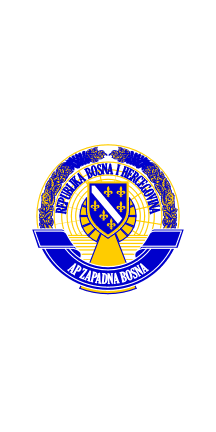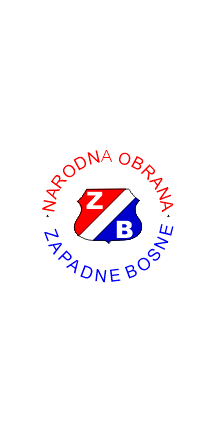
by Željko Heimer, 8 January 2005

Last modified: 2005-02-19 by dov gutterman
Keywords: western bosnia | zapadna bosna | bosnia and herzegovina | balkans | fleur-de-lys | bee | hexagone |
Links: FOTW homepage |
search |
disclaimer and copyright |
write us |
mirrors
See also:
In the documents reprinted in several newspapers after the
military ofensive of Croatian Army and 5. corps of Army of Bosnia
and Herzegovina (begining of August 1995), there were shown a
coat of arms of the self proclaimed Autonomous region of Western
Bosnia. It was seen on headers of official documents, and on
other material, and I suppose that some kind of similar design
was also used as a flag (as it is usual in this part of the World
to put the coat of arms on flag).
It is an olive (?) coronet with three quadrangles underneath. I
never saw it coloured. What is the simbolism and origin of it, I
don't know. The coronet is presumably standing for peace, but
what are the squares? I read them as a path (compare it to the
similar road sign for highway). If that is true it should stand
for "a road of three nations towards peace".
The Western Bosnia is a region around the town of Bihac, a Muslim
enclave which was surounded on three sides with Croatian Serbs'
Krajina, and on east with Bosnian Serb held teritory. The enclave
was led by the politician Fikret Abdic, and the region was spared
from major devastation at the beggining of the war in Bosnia.
Later there was an argument between Abdic and the Sarajevo
government, and he declared an Autonomous Province of Western
Bosnia. The fighting started then between the government loyal
troups in 5. corps of the Army of Bosnia and Herzegovina in Bihac
and Abdic's forces stationed in the town of Velika Kladusa.
Abdic's forces allyed with Serbs, and retreated to Serb occupied
territory in Croatia. A week before the Croatian-Bosnian
offensive, and the end of Serb Krayina in Croatia, and liberation
of Bihac enclave, Abdic proclaimed the total separation from
Sarajevo, forming the Republic of Western Bosnia.
The coat was used in the last days of this Republic, and if it
was used before, also for Autonomous Province, I have no
information.
Unfortunatelly, I misplaced the newspapers (the events happened
during the summer holydays) where it was pictured, so I can't
scan it. The best I can do is to make this sketch. I hope it
would do for now.
Željko Heimer, 27 September 1995

by Željko Heimer, 8 January 2005
zapba.gif)
Coat of Arms
by Željko Heimer, 8 January 2005
The flags from formed region of Western Bosnia have always be
a kind of mistery among vexillologists. Several were reported
among which some very doubious, like those in this page.
The only flag that I have witnessed myself is the flag of the
national defence forces. That is however not the
"national" flag, but just the flag of that force.
However, in the mean time I had luck to discover a new one. In
the early 2004 I visited the Croatian history Museum, just at the
same time when an antique dealer was there offering someof his
item to the museum. Jelena Borošak-Marjanovic, who knew of
my interest in flags showed me one of the items Mr. Mladen
Vukuša was selling - a flag from Bihac. Jelena also
courteously gave me a photo the museum photographer has made of
this flag. I have drawn my gif according to the photo. The
flag is white intended for vertical hoisting, made of a single
piece of artifical material (polyester) measuring ca. 150x300 cm.
In the middle of it in dimater about 100 cm is an emblem
silk-screen printed in two colours. The emblem, presumably the
coat of arms of the autonomous region, consists of the coat of
arms of Bosnia and Herzegovina (contemporary one with
fleurs-de-lis and bend) infront of a meash of circular lines
(presumably inspired by the UN emblem?) and within a wreath of
leaves with a blue ribbon in the base bearing the white
inscription "AP ZAPADNA BOSNA". Above the shield is
blue inscription "REPUBLIKA BOSNA I HERCEGOVINA".
Željko Heimer, 8 January 2005
Adopted: after September 1993. Abandoned: 26 July 1995
The flag is based on the contemporary flag of Bosnia and
Herzegovina, with honeybee as a symbol of prosperity. The flag is
not confirmed by local sources, but some other vexillological
sources quote similar flags for Western Bosnia.
Western Bosnia was an enclave in north-western part of B&H,
surrounded by Serb held territory in B&H and Croatia, around
the towns of Bihac and Velika Kladusa. The local polititian and
businessman Fikret Abdic sucseeded in holding the (largely
Bosniak populated) area unconquered, trading with all sides, and
retaining kind of neutrality. In the crucial period in 1995 just
before great Croatian offensive that lead to liberation of
Krayina and large areas of B&H, he connected his 'dominion'
with Serb side and in July proclaimed independence from Sarajevo
government. Due to the strong offensive, this state lasted just
for some 10 days.
Source: Jaume Olle's Electronical Bulletin of
Vexillology from Catalonia
Željko Heimer
Adopted: 26 July 1995. Abandoned: 5 August 1995.
The flag of the Republic proclaimed in the last days of the
Western Bosnia authonomy allegedly changed some blue parts of the
previous flag to green. This is not confrmed by local source.
Source: Jaume Olle's Electronical Bulletin of
Vexillology from Catalonia
Željko Heimer

by Željko Heimer, 29 April 2001
The flag of the National Defence of Western Bosnia (Narodna
obrana Zapadne Bosne), the military formation organized in
Western Bosnia in (or not much before) 1995 as the defence force
of the Authonomous Region under the leadership of Fikret Abdic.
The flag was shown yesterday (28.APR.2001) in a documentary clip
about Fikret Abdic, showing some celebration of the said
formation. The flag was hoisted "normal" way but the
design was obviously mented to be used vertically. Being seen in
only a brief moment on TV, this is just a sketch - I am not quite
sure about the colour that I have presented blue in my image -
quite possibly it was green. Also the text might have had little
differences as well as the shape of the shield.
The flag was most certainly abandoned in summer 1995 when Western
Bosnia dissolved as entity.
Željko Heimer, 29 April 2001
Fikret Abdic, the leader of the moslim rebels in the moslim
enclave of Bihac (Northwestern part of Bosnia and Hercegovina),
has declared 26 July 1995 the 'Republic of West-Bosnia' over the
territory in his possession. In september 1993 he declared the
enclave already autonomous from Sarajevo.
Source: NRC Handelsblad (Rotterdam) 27 July 1995.
Jos Poels, 30 July 1995
It is, of course, the coat of Abdic's state that no longer
exists.
And to satisfy your curiosity, Abdic, as all of his followers,
are abolished (but those that are accused for war crimes, and I
haven't heard if any is). Newspapers speculate that Abdic is in
Zagreb, and the Croatian government has indirectly confirmed
that. The Bosnian government have not sent any request for
extradiction, and the matter is on ice, for the time being. I
think that he is not going to be pursecuted, because of the fact
that he is a very strong businessman needed to resurrect the
Bosnian economy.
When I said that Abdic was abolished I was reffering to the Law
on Abolition, passed by the Croatian parliament, granting
abolition of prosecution to persons who joined (of free will or
by force) the enemy troups. In this way, most of the soldiers
that surrendered to the Croatian Army are now free citizens of
Croatia, or if they wished they could go to third countries (as
it is said here, meaning that they didn't want to stay in
Croatia, so thay left, mainly to Serbia).
The law was intended first of all for rebel Serb soldiers, but as
Abdic, and his followes, surrended to Croatian Army, the part of
the treaty of surrender was that the same law would act for them
also.
Željko Heimer, 29 September 1995
In a report on Euronews (some months ago), I saw two arms
which could be former projects of the arms of the former Republic
of Western Bosnia.
The first is the same as the Bosnian one but there is a thick
yellow border around it. On the diagonal stripe appear three blue
hexagones, and over all on the diagonal stripe just above the
second lower fleur de lys a big yellow bee or something like that
with blue wings, as well as blue "contours".
The second one is the same but the fleurs de lys are yellow on
green (green maybe here for Muslims), the bee is yellow with
green wings,there is just one hexagone (and under the bee) in
green on the diagonal stripe which is still white.
I think the "bee" and the hexagone are coming from the
logo of AGROKOMERC the firm of which Fikret Abdic was the
manager.
In the report, it was said that there was a flag, and I think
that it was white with the arms in the centre but I'm not sure of
that.
Pascal Vagnat, 23 November 1995